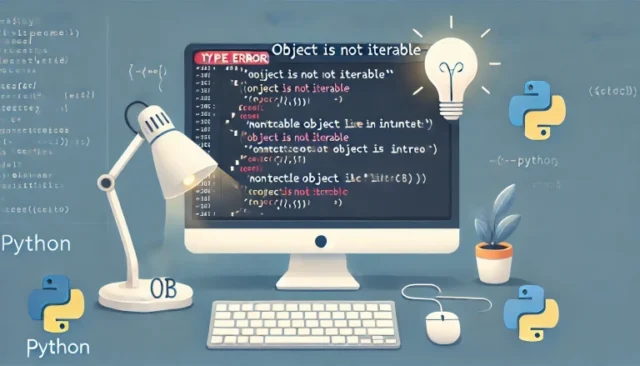When working with Python, you might have come across the infamous TypeError: 'object is not iterable'. This error is a common stumbling block for developers, particularly those new to Python. But don’t worry—in this post, we’ll explain why this error occurs, how to fix it, and what it means to have an iterable in Python.
We’ll also provide examples of scenarios where this error might pop up and share best practices for avoiding it. Let’s dive into understanding and solving the ‘object is not iterable’ TypeError.
What Does ‘Object Is Not Iterable’ Mean?
In Python, an iterable is any object that can be looped over using a for loop. Examples of iterables include lists, tuples, dictionaries, sets, and strings. The error TypeError: ‘object is not iterable’ occurs when you attempt to iterate over an object that cannot be iterated over, meaning that Python does not know how to loop through it.
To put it simply, you cannot use a for loop or other iterable-based operations on non-iterable objects, such as integers or floats.
Examples of Iterables:
- Lists:
[1, 2, 3] - Strings:
'Hello' - Tuples:
(1, 2, 3) - Dictionaries:
{'key': 'value'}
Non-Iterables:
- Integers:
5 - Floats:
3.14 - Boolean:
TrueorFalse
Common Scenarios Where This Error Occurs
Let’s take a look at some common scenarios where the TypeError occurs and how to fix it.
1. Trying to Iterate Over a Non-Iterable Object
Consider the following code snippet:
number = 42
for i in number:
print(i)In this example, number is an integer and is not iterable. Python throws a TypeError because it doesn’t know how to loop through an integer.
Solution: To fix this error, make sure the object is iterable. For instance, if you want to iterate over a range of numbers, use the range() function:
for i in range(number):
print(i)This way, you create an iterable sequence of numbers from 0 to 41, allowing the loop to iterate correctly.
2. Unpacking a Non-Iterable Object
Another common reason for this error is trying to unpack a non-iterable object. For example:
x, y = 10In this case, 10 is a single integer value, and Python is trying to unpack it into two variables x and y. This will lead to the TypeError.
Solution: To avoid this error, make sure that you are unpacking an iterable with the correct number of elements:
x, y = (10, 20) # Unpacking a tupleHere, we are unpacking a tuple with two values, so the unpacking is successful.
3. Using Incorrect Return Types
Sometimes, you might accidentally use a function that returns a non-iterable object when you expect an iterable. Consider this example:
def get_number():
return 100
for i in get_number():
print(i)The function get_number() returns an integer, which is not iterable, causing the TypeError.
Solution: Make sure that the function returns an iterable, such as a list or a range:
def get_numbers():
return [1, 2, 3, 4, 5]
for i in get_numbers():
print(i)Now, get_numbers() returns a list, which is iterable, allowing the loop to work properly.
Best Practices to Avoid ‘Object Is Not Iterable’ Errors
- Check Object Type Before Iterating: Before using a for loop, verify if the object is an iterable using
isinstance():
if isinstance(my_object, (list, tuple, set, dict, str)):
for item in my_object:
print(item)
else:
print("Object is not iterable.")- Return Iterables from Functions: When creating functions that will be iterated over, ensure they return an iterable, such as a list or tuple.
- Use Python’s Built-in Functions: Use functions like
range()to generate sequences of numbers for iteration, ensuring that the object is iterable.
Common Pitfalls and How to Fix Them
Pitfall: Using None as an Iterable
Another common issue is trying to iterate over None. For example:
my_var = None
for i in my_var:
print(i)None is not iterable, and attempting to loop through it will raise a TypeError.
Solution: Ensure that the variable is assigned an iterable value before iteration:
my_var = [1, 2, 3]
for i in my_var:
print(i)Conclusion
The TypeError: ‘object is not iterable’ is a common error that occurs when attempting to iterate over a non-iterable object in Python. By understanding what makes an object iterable and following best practices to verify the type of objects, you can avoid this error and write more robust Python code.
Always remember to double-check the objects you are iterating over and ensure that they are iterable, such as lists, tuples, or strings. This will save you from encountering unnecessary errors and make your code more predictable and error-free.
